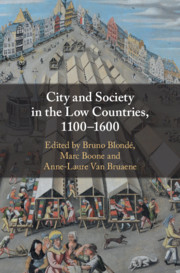 The Low Countries was collectively one of the earliest and most heavily urbanised societies in European history. Present-day Belgium and the Netherlands still share important common features, such as comparatively low income inequalities, high levels of per capita income, a balanced political structure, and a strong 'civil society'.
The Low Countries was collectively one of the earliest and most heavily urbanised societies in European history. Present-day Belgium and the Netherlands still share important common features, such as comparatively low income inequalities, high levels of per capita income, a balanced political structure, and a strong 'civil society'. This book (edited by Bruno Blondé, Marc Boone and Anne-Laure Van Bruaene) traces the origins of this specific social model in medieval patterns of urbanisation, while also searching for explanations for the historical reproduction of social inequalities. Access to cheap inland river navigation and to the sea generated a 'river delta' urbanisation that explains the persistence of a decentralised urban economic network, marked by intensive cooperation and competition and by the absence of real metropolises. Internally as well, powerful checks and balances prevented money and power from being concentrated. Ultimately, however, the utmost defining characteristic of the Low Countries' urban cultures was located in their resilient middle classes.
This multi-authored and accessible volume, that resulted from a collaborative inter-university project on the social history of the city, offers a balanced and up-to-date view on relevant debates, and explicitly deals with the spatial and material dimensions of urban history.
No comments:
Post a Comment